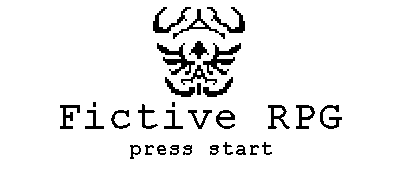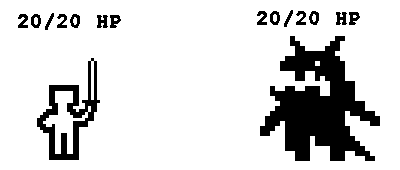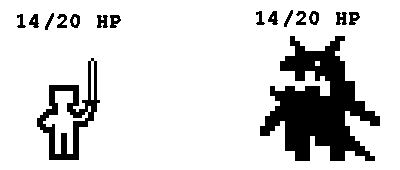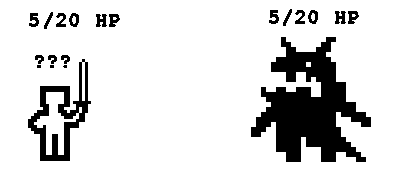In part 3 of this series, I discussed games of sufficient complexity. How much is "sufficient?" Coming up with an answer seems less difficult after we clearly defined interesting choices in part 1. But finding and phrasing a specific answer will still be quite challenging. To illustrate exactly how much complexity is sufficient and how to calculate it we will build a fictional RPG called Fictive RPG in which we'll add battle/combat complexities one by one until there's enough for interesting choices to emerge. I chose the RPG genre because the rules are simple, math based for calculations, and because RPGs work well without real-time or spatial gameplay dynamics.

We'll start with nothing. That's right. 0 rules. 0 complexities. Now that we're are all on the same page, let's add 2 characters that each have 20 HP named HERO (the player character) and BOSS. Just to keep this illustration simple, we'll say that this RPG has no story or battles outside of this first and final showdown.
The rules of the game are simple. Reduce BOSS HP down to 0 before your HP is reduced to 0. So far, there isn't a way for either character to do so. We need mechanics. So, let's introduce ATTACK. This move does 2 damage to the opposing target. Both HERO and BOSS can ATTACK. I'll also add that the game is turn-based, and the player always gets the first move. That's it. No nuances or hidden properties to worry about.

So, now the game is playable. Technically, Fictive RPG is not a game yet, and it definitely doesn't have any interesting choices. Like the Super Press Space To Win Adventure RPG 2009 a flash game that has inspired this hilariously passionate and ignorant reply dramatized in this video, there's no real way to lose in Fictive RPG. With no way to lose, there's no game. With only one mechanic, there are no choices.
Fictive RPG needs more mechanics/options. And if we go the standard RPG design route, we might add ITEMS and MAGIC mechanics. Let's say ITEM heals 10 HP. And MAGIC shoots a fireball for 3 damage. Even though this is a simplified model, it's clear that having these three options are not sufficient for the emergence of interesting choices. The reason is that there's a dominant and obvious strategy:
- Attack with MAGIC until you have 2 HP remaining, then use ITEM, and repeat.
- If BOSS has MAGIC as well, then attack until you have 2-3 HP remaining, and then us ITEM, and repeat.
- If the BOSS has MAGIC and ITEM, then repeat the previous strategy knowing that the match might be an unwinnable stalemate depending on how the BOSS AI acts.

It's foolish not to use these strategies. Sirlin calls this sub-optimal play. In this case, with no interesting choices, all options outside of these dominant strategies just seem like bad ideas. It's not really a matter of having a different playstyle. When a game is reduced to "do this or lose," choosing to lose doesn't exhibit much meaningful self expression. I might argue that so far in Fictive RPG choosing to win is equally devoid of self expression.
It's the same with any creative endeavour. If you're charged with the task of expressing yourself via carving a sculpture out of of wood, and you submit a 2D pen and ink drawing, you clearly opted out of the challenge. So in a video game, if your choices don't make up a playstyle that aims to win in the game, you opt out of the challenge. Since games are challenges, trying to derive meaning out of intentionally losing is difficult because it creates a hidden or subjective value scale required to conceptualize the choices. Without context actions are meaningless.
Consider Our Current Options
Fictive RPG needs more before interesting choices can emerge. So far there are only two properties in the design space: +/- HP and time. Before adding more properties to the game, we can consider adding more mechanics that manipulate these 2 aspects in different ways. By designing dynamic mechanics that either look to a variable (HP) or that affect more than one variable (HP and time) we can create actions that have more push-pull or give-and-take than the basic options. For example, we could add an item that heals you to max HP but forces you to lose a turn. Or we could add an attack that does more damage when the player is below 30% health. There are still many creative possibilities here, but none of them will give the game interesting choices. The dominant strategy will still be to attack with the strongest moves available and heal just before dying. Yes, it's the dreaded attack-attack-heal tactic that I expressed my disapproval of for years.
Consider Double Blind Design
What if we add a double blind design to the combat? Even if the HERO always goes first, when both characters enter their moves at the same time there's potential for prediction. Even without adding any new properties, we could design an attack called GUESS that does 5 damage if the BOSS uses ITEM on the same turn yet fails if the BOSS does otherwise. Also, if you guess correctly the healing effect of the BOSS's ITEM is negated. Now this makes things a bit more interesting. If the BOSS plays according to the optimal strategy, this can lead to its undoing! If you try to anticipate the BOSS's moves you could functionally sacrifice a turn!

Adding double blind encounters into the core combat design is an easy way to add risk, reward, and variety to the battle. It's obvious how a wrong guess will cost you and how mechanics designed around guesswork allow the player to make some interesting choices. But I'm hesitant to call "mission complete" at this point. With "double-blind mechanics" designed around the risk-reward of correct guessing, players can essentially gain/lose turns or receive other kinds of advantages/disadvantages based on their predictions. This makes the difference between the version of Fictive RPG without double-blind design and with it an easily calculateable stalemate scenario versus a scenario where correct guesses are the only way to win. I'm not so sure that gameplay that hinges on correct guesses qualifies as making informed decisions. Double blind design gets us closer to our goal of interesting choices, but there still aren't enough complexities in Fictive RPG. So if we factor in new GUESS mechanic that only the player can use all we've really done is introduce another step into the dominant strategy outlined above.
- If the BOSS has MAGIC and ITEM, then repeat the previous strategy while considering using GUESS instead of ATTACK especially when the BOSS HP is between 8-12. If you guess wrong, continue using GUESS until your HP drops between 2-3 HP, use ITEM, and repeat. After all, the boss must use ITEM sometime. If you get bored, use ATTACK once and revert back to continual GUESSes.
In the end, the dominant strategy has a few more steps, but it's still pretty simple. Furthermore, I don't think introducing double-blind mechanics/design would be very instructive for our investigation. When you think about it, a double-blind encounter is functionally similar to real-time gameplay. Fictive RPG is about observing how a game can support interesting choices without appealing to real-time dynamics.
Consider Dynamics
Dynamics are the way to go. Even in the ideas I presented above when we considered our current options with Fictive RPG's existing properties, it's clear how dynamic mechanics make figuring out how a move measures up on the value scale more difficult. Remember the dynamics we're talking about here are when a mechanic looks at one variable (like HERO HP) to determine another variable (like damage). It's easy to see that the more properties/variables in our game system, the more combinations of dynamic mechanics we can designed. To better understand this idea, let's look at the range of variables other games use.
Pokemon Black and White uses 6 stats, 1 ability, 1 held item, gender, and 4 moves per Pokemon. Each Pokemon can be inflicted with any number of 8 stat alterations, and just 1 of 8 status effects. With 6 Pokemon per team, field conditions, weather conditions, and 17 types with different weaknesses and resistances to each other there's more than enough properties for the game to create dynamic and variable mechanics. With so many moves that stress different parts of the design space in different ways, the design is ripe for interesting choices to emerge.
It's the same with Advance Wars: Days of Ruin. Each unit has HP (which doubles as attack power and defense power), weapons (2 max), ammo, fuel, movement distance, movement type, land/sea/air type, and a unit type. Then there are different types of terrain that affect unit movement and defensive power. Some buildings launch missiles or produce land/sea/air units. While other buildings include the HQ for your main base, and Com Towers for atk/def buffs. Factor in that the unit matchups in this game are far more complex than Pokemon and Advance Wars has enough properties for interesting choices to emerge.
So how much is it? How many complexities do we need to add before Fictive RPG has interesting choices? The investigation continues in part 5.